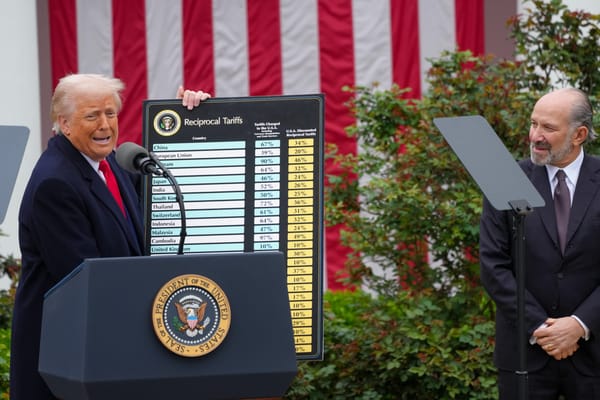We Now See Anti-Racism Is Patriotism
There's virtually no resistance to tearing down Confederate statues.

The Republican Party’s influence over the meaning of patriotism over the last 50 years cannot be overstated. Americans inside and outside the party today still credit Ronald Reagan, considered the father of modern conservatism, for defeating the Soviet Union, leading to international conditions by which the US remade the world in its image. Americans inside and outside the GOP, especially after September 11, 2001, equated the Republican Party’s rah-rah militarism with love of country. In the early years of this century, being a Republican was almost synonymous with being a patriot.
As they stood with the Confederacy, the Republicans stood with Trump. As they stood with foreign enemies of the past, they stood with foreign enemies of the present.
The Republican grip on the meaning of patriotism was so nearly total that when black activists demanded the removal of statues in public squares across the south that honored generals, war heroes and other notables of the old Confederacy, the patriotism of their defenders, who were always Republican, was never in doubt. News stories in fact never touched on patriotism or loyalty. The press framing was instead nearly always between activism and “heritage” or anti-racism and racism—if you were lucky. The same dynamic played out in every controversy over the Confederate flag.
Compare that to the last fortnight. An outgrowth of the massive nationwide protests demanding justice for the murder of George Floyd has been a renewed push to remove Confederate statues—and there’s been almost no resistance. Protesters aren’t even waiting for due process. They’re just tearing them down. So far, the public seems to approve. The NFL, meanwhile, apologized for not taking Black Lives Matter seriously. NASCAR announced a ban on the Confederate flag. Senate Democrats are daring the president to veto a defense spending bill that includes provisions requiring the renaming of major military bases named after Confederates, like Fort Benning.
Don’t forget the tip jar!
It bears repeating the Confederacy left the United States in order to preserve slavery. The men memorialized in public squares across the south, looking regal on their high horses, gazing over the landscape with eyes heavy with the wisdom of the ancients, betrayed us. Traitors, all of them, and what’s more they invaded and tried bringing down the United States, killing 750,000 in the process. To honor these “heroes” is to honor slavery and racism. It’s to honor sadism and treason. It’s to honor the enemy.
That was clouded by tales of a “culture war” in which fierce rivals fought each other but were loyal to the same country. That “culture war,” however, started receding from the foreground on the day the Republican Party formally nominated Donald Trump for president. During the 2016 Republican National Convention, someone passed around little Russian flags. It was supposed to be a joke, it was reported afterward, a way of mocking Democrats who accused Trump of being in the Kremlin’s pay in order to compensate for Hillary Clinton’s flaws. But to many of us the flags were no joke.
They were prescient. Over the course of Trump’s first term, we learned of Russia’s covert operation to sabotage the president’s Democratic rival in order to aid and abet Trump’s candidacy. We learned of Republican congressional leaders, in full knowledge of the Kremlin’s ongoing violation of our sovereignty, standing aside and letting it happen. And we witnessed earlier this year the Republican Senate acquitting the president of an international criminal conspiracy to defraud the American people. As they stood with the Confederacy, the Republicans stood with Trump. As they stood with foreign enemies of the past, they stood with foreign enemies of the present.
The GOP is leaving behind a vacuum being filled by a massive cross-demographic coalition threatening to bulldoze the GOP.
This leaves a vacuum being filled by black activists, feminists, liberals, socialists, honest conservatives, former Republicans—a massive cross-demographic coalition threatening to bulldoze the GOP. Protesters had public support before the president gassed them out of the way for a photo op. Afterward, support went through the roof, according to USA Today. That was “defining moment,” the paper said. It appears to have crystallized something in the American psyche, made a fluid aspect more permanent, compelled a majority to see that anti-racism is patriotism. More importantly, a majority of the people can see, and (I dearly hope) will continue to see, that systemic racism and state violence in a diverse republic are the most fascist things of all.
The once-fraught debate over Confederate statues is no longer fraught. It’s no longer between activism and “heritage” or anti-racism and racism. There’s not even a mushy middle in which the understanding of the Civil War is “complicated” while imbuing traitors and sadists with nobility and grace. That time is over. What had been an argument now appears settled. This is what happens when a major political party not only abandons patriotism, it sides with the enemies of the past and the present.
—John Stoehr




